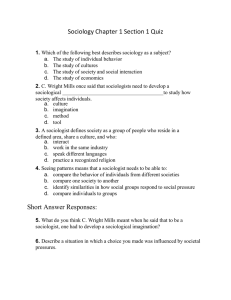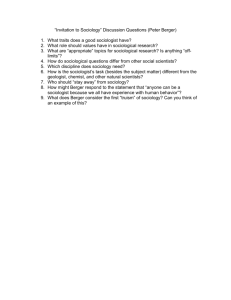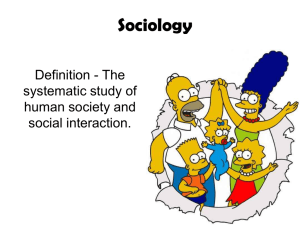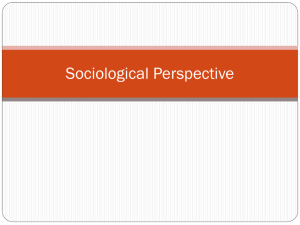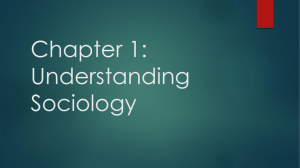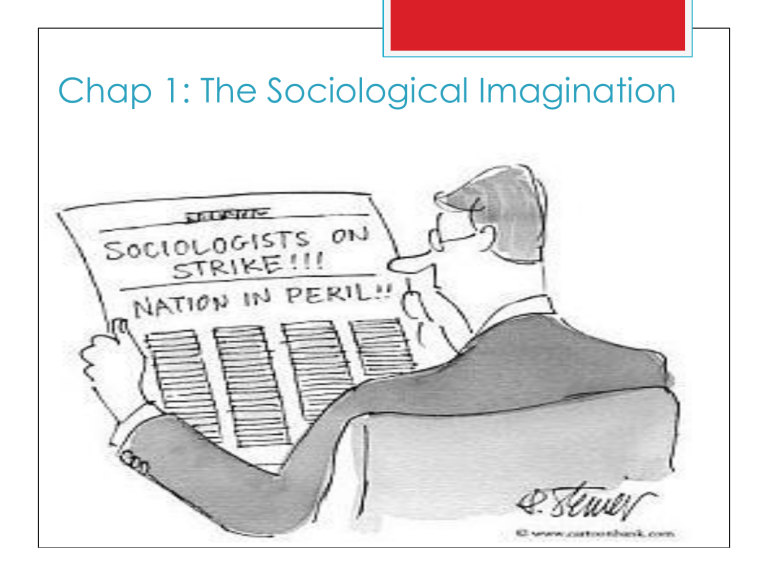
Chap 1: The Sociological Imagination C. Wright Mills: The Sociological Imagination (1959) ⮚ ⮚ “Quality of the mind” What we understand as “individual issue”… always influenced by time, and place! ⮚ When you were born, where you were born, to whom you were born ⮚ Return to sports… It is “sociologically UNimaginative” AA can’t swim because of “muscle mass?” The Sociological Imagination “Neither the life of an individual nor the history of a society can be understood without understanding both.” – C. Wright Mills ⮚ ⮚ Definition “The capacity to think systematically about how social context impacts individual lives.” The ability to see the interplay between society and self, history and biography. Not especially Sociologically Imaginative to argue that …. ⮚ ⮚ ⮚ The inequalities we see ⮚ the success of some, struggles of others ⮚ ⮚ Sure, “talent” matters hard work matters ⮚ Institutions part of social structure Purely a function of individual drive and talent Social Structure ALSO matters! ⮚ ⮚ ⮚ ⮚ 1. SCHOOLS Should we group children in 3 month age groups? 2. Youth Hockey in Canada Hierarchies part of our Social Structure Sahith Thegalla? ⮚ ⮚ Is Kathleen Deveny (the author) missing the Sociological Imagination “gene” ? Is Newsweek? Peter Berger, Invitation to Sociology ⮚ What sociology is NOT? ⮚ I want to work with people ⮚ Social work ⮚ Soc is not a “practice” ⮚ Social reformer ⮚ Not a compiler of numbers Invitation to Sociology ⮚ What sociology IS? ⮚ “Value Free” ⮚ ⮚ ⮚ ⮚ ⮚ ⮚ ⮚ Is that even possible? But the ideal A good spy A professional Peeping Tom A “scientist”? The Sociologist is “someone concerned with understanding society in a disciplined way” p. 16 “Intensely, endlessly, shamelessly, interested in the doings of men” p. 19 My fav quotes… ⮚ ⮚ ⮚ ⮚ The sociologist is “the person who must listen to gossip despite himself, who is tempted to look through keyholes, to read other’s mail, to open closed cabinets (p. 21) It can be said that the first wisdom of sociology is this – things are not what they seem (p. 23) p. 24 P. 176 Do we agree with Berger? ⮚ Sociology is an attempt to understand, not to reform the world, to bring about justice, fix social problems, etc. ⮚ ⮚ Berger… a frustrated sociologist at the end of his life How I think of it? “Social Context” The social context includes: ⮚ Social Interaction (We are “pathetically social”) ⮚ ⮚ How individuals behave with or in relation to others. ⮚ ⮚ Norms (behavioral rules we live by) ⮚ learn through interactions with others. Social Structure ⮚ Patterned societal arrangements that enable and constrain individual behavior. ⮚ Or, arrangement of institutions whereby human beings in a society interact and live together. ⮚ Institutions and Hierarchies ⮚ E.g., School system, Canadian Youth Hockey… are institutions ⮚ E.g., Race, Social Class, Gender, Age, etc. Understanding Social Context ⮚ Nuclear & extended family Neighborhood & community Institutions & organizations Country of birth Historical period RACE GENDER And… SOCIAL CLASS ⮚ Did not choose these things ⮚ ⮚ ⮚ ⮚ ⮚ ⮚ ⮚ ⮚ Ques for class about friendship. Do we “choose” our friends? Fill out the chart for your four closest friends. ⮚ ⮚ 1 = Friend is a different _____ than you are 0 = Friend is the same _____ as you (Don’t divide by 4) Gender Race Class Religion Sexual Orientation Total Friend 1 Friend 2 Friend 3 Friend 4 Grand Total = ÷4 Rounded Score = Free will…………..Determinism ⮚ Free will ⮚ ⮚ ⮚ ⮚ humans act on their own volition the ability to act at one's own discretion freedom of humans to make choices that are not determined by prior causes or by divine intervention Determinism human actions determined by factors the individual cannot control ⮚ causally determined by preceding events or natural laws ⮚ ⮚ Social Structures (hierarchies and institutions) determine our path through life? I am in the Free Will camp! But not for the reasons you think ⮚ Free will does NOT mean “unpredictable”… does not mean social context does not matter ⮚ Social context OBVIOUSLY matters!!!! ⮚ If I was born in…. India (obviously I can’t choose where I am born) So if I did not choose India, what does “freedom” mean? ⮚ “Freedom,” context!! yes! BUT within a given social ⮚ Rational Choice Theory. We humans are “rational” actors ⮚ We weigh costs and benefits… make rational choices. ⮚ ******But social context impacts or options!!!! ⮚ If I was born into poverty in India? My “options?” Two Illustrations ⮚ 1. Want to make a deal? ⮚ You are not robots ⮚ Your actions are not “determined” ⮚ ⮚ But you will all ACT like robots Why? RATIONAL CHOICE ⮚ ⮚ You ARE free to choose 2. Male volunteer? Think about crime… Completely random? Unpredictable? ⮚ What variables might help us predict ⮚ ⮚ ⮚ ⮚ ⮚ Family Peers SES School success Or homelessness….. ⮚ When you see a homeless person, what are you thinking? “bad choices” e.g., drugs or alcohol? ⮚ Does not want to work? ⮚ ⮚ These answers? Not Sociologically Imaginative ⮚ Sociology encourages us to look beyond the individualistic Nicholas Kristof of the NYT ⮚ https://www.nytimes.com/2015/06/14/opinion/sunday /nicholas-kristof-its-not-just-about-bad-choices.html ⮚ When he ASKS the homeless what do they tell him? ⮚ ⮚ All me! I made bad choices But what does he find when he asks about their biography? ⮚ Not born on “third base”! ⮚ Kristof mentions Mullainathan and Shafir book Scarcity… http://www.princeton.edu/main/news/archive/S3 7/75/69M50/index.xml?section=topstories ⮚ ⮚ ⮚ Sugarcane farmers before and after the harvest. Hunger impacts…. “INTELLIGENCE”? Manza text (p. 12) mentions Pat Sharkey research ⮚ ⮚ Children who witness homicide score lower on standardized tests the week after the homicide! Ok, Perrin, but… “I knew this guy…” Think about implications…. ⮚ Children who grow up… ⮚ ⮚ ⮚ ⮚ ⮚ ⮚ In violent communities In poverty With abusive and violent parents Drugs and alcohol… With parents who were verbally abusive Etc. etc. etc. School on Monday morning!!!! ⮚ We need not abandon “choice”… need not abandon “free will” ⮚ ⮚ But “choice” and “freedom” in Social Context Will we ever figure it all out??? Nope… not possible ⮚ Sociological theories do NOT assume that people have no choices. ⮚ Instead, our theories concentrate on how different people have a (1) different basis for making choices and (2) different alternatives from which to choose ⮚ ⮚ ⮚ ⮚ Different basis for making choices Different alternatives from which to choose Soc Imagination encourages us to see this!
